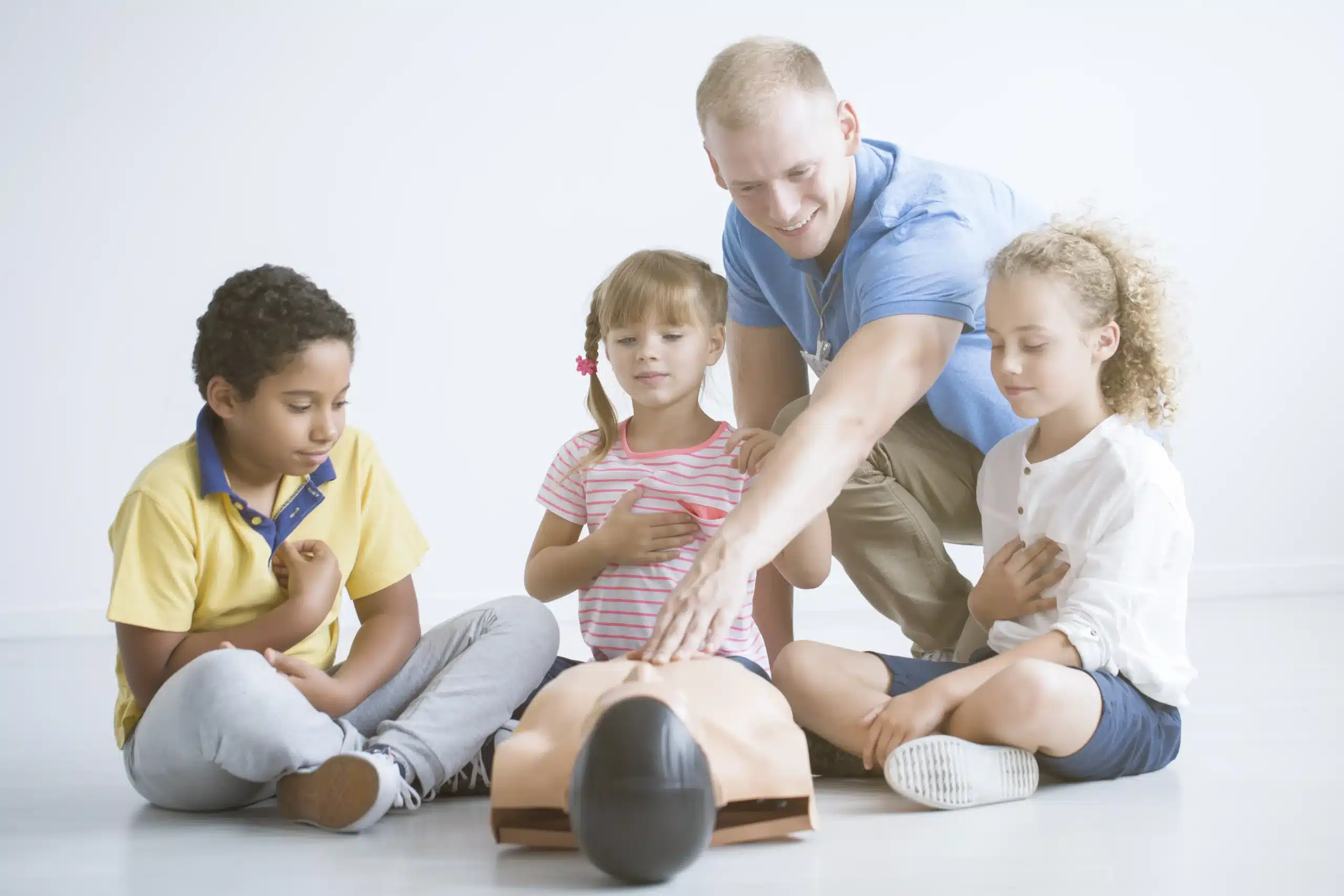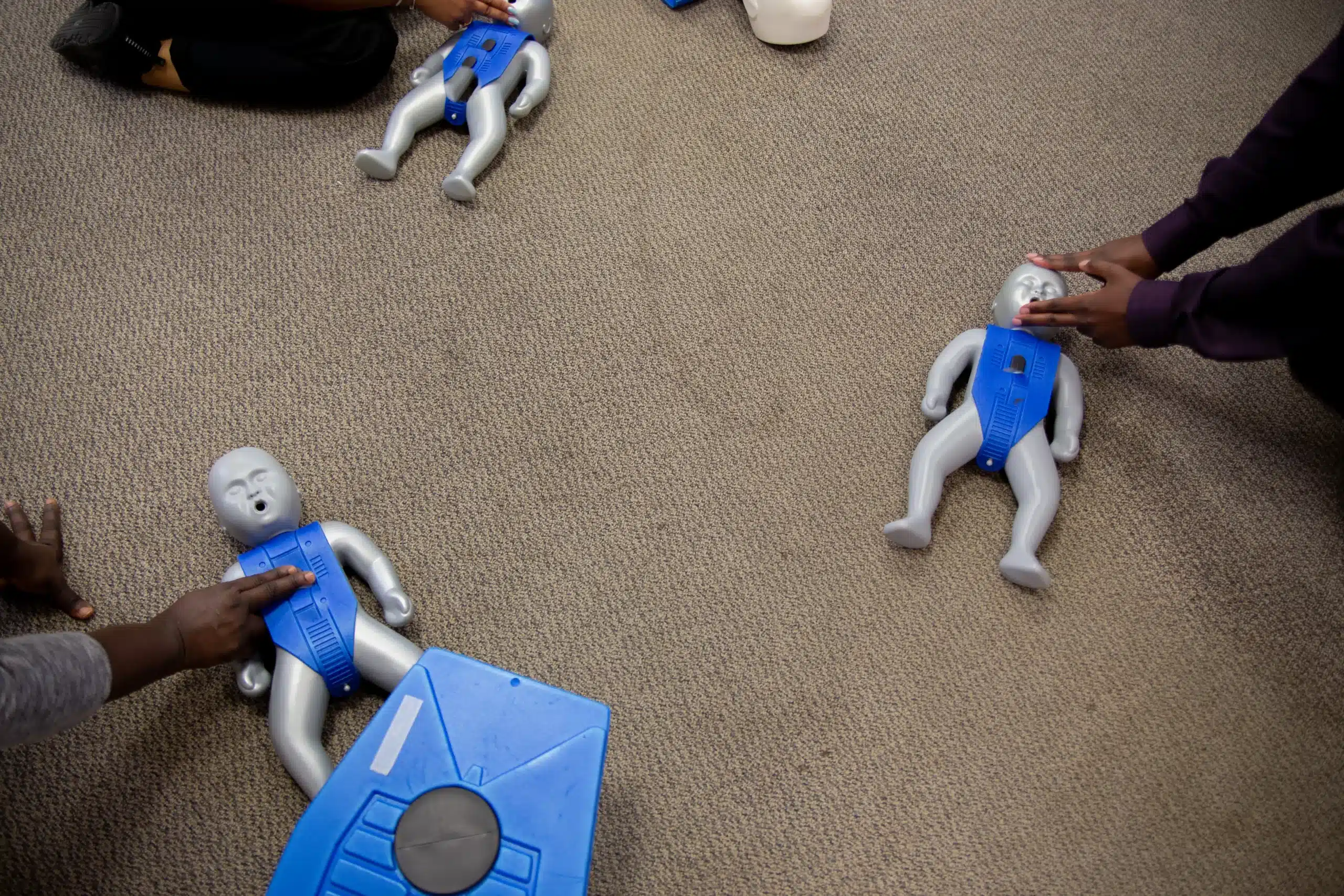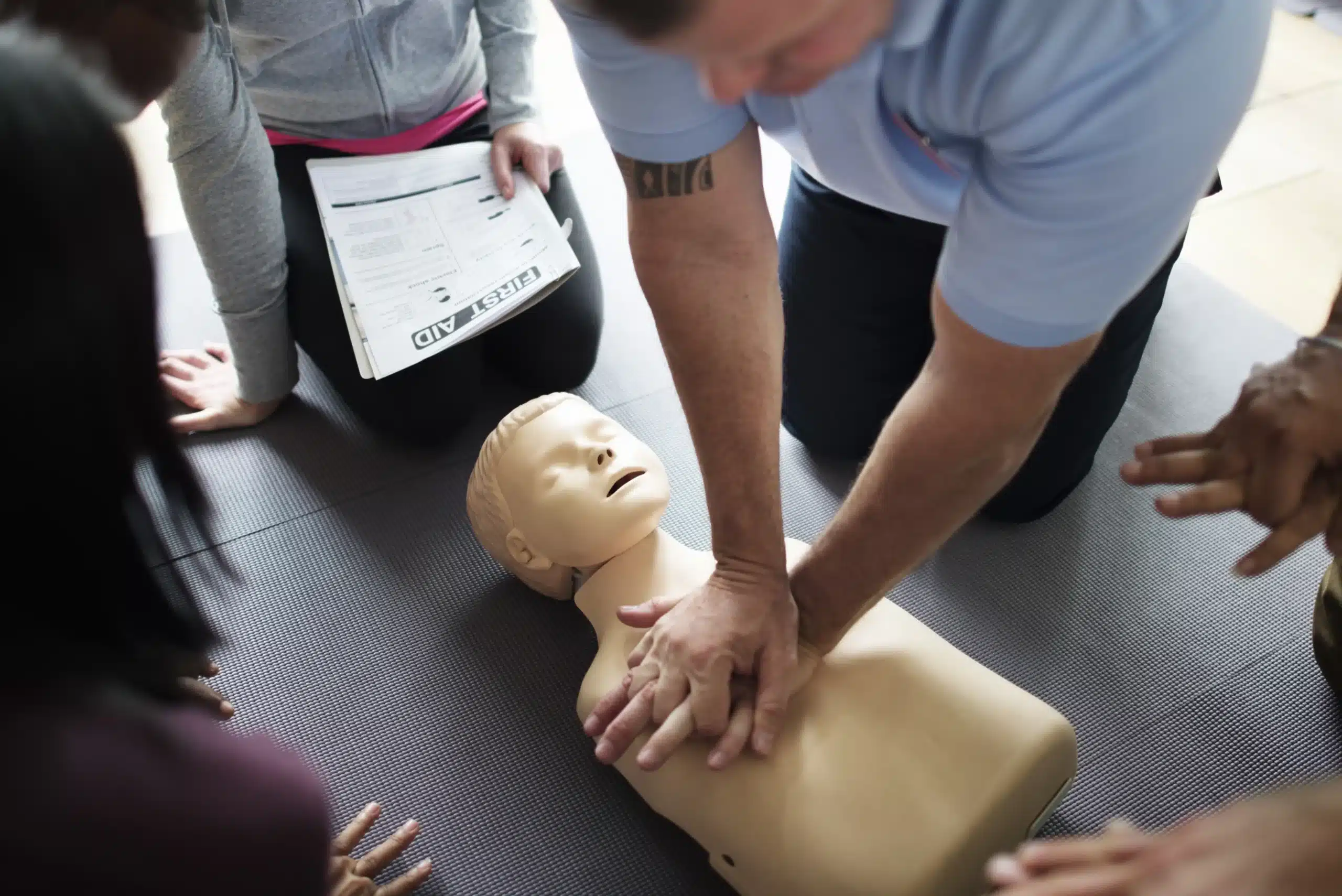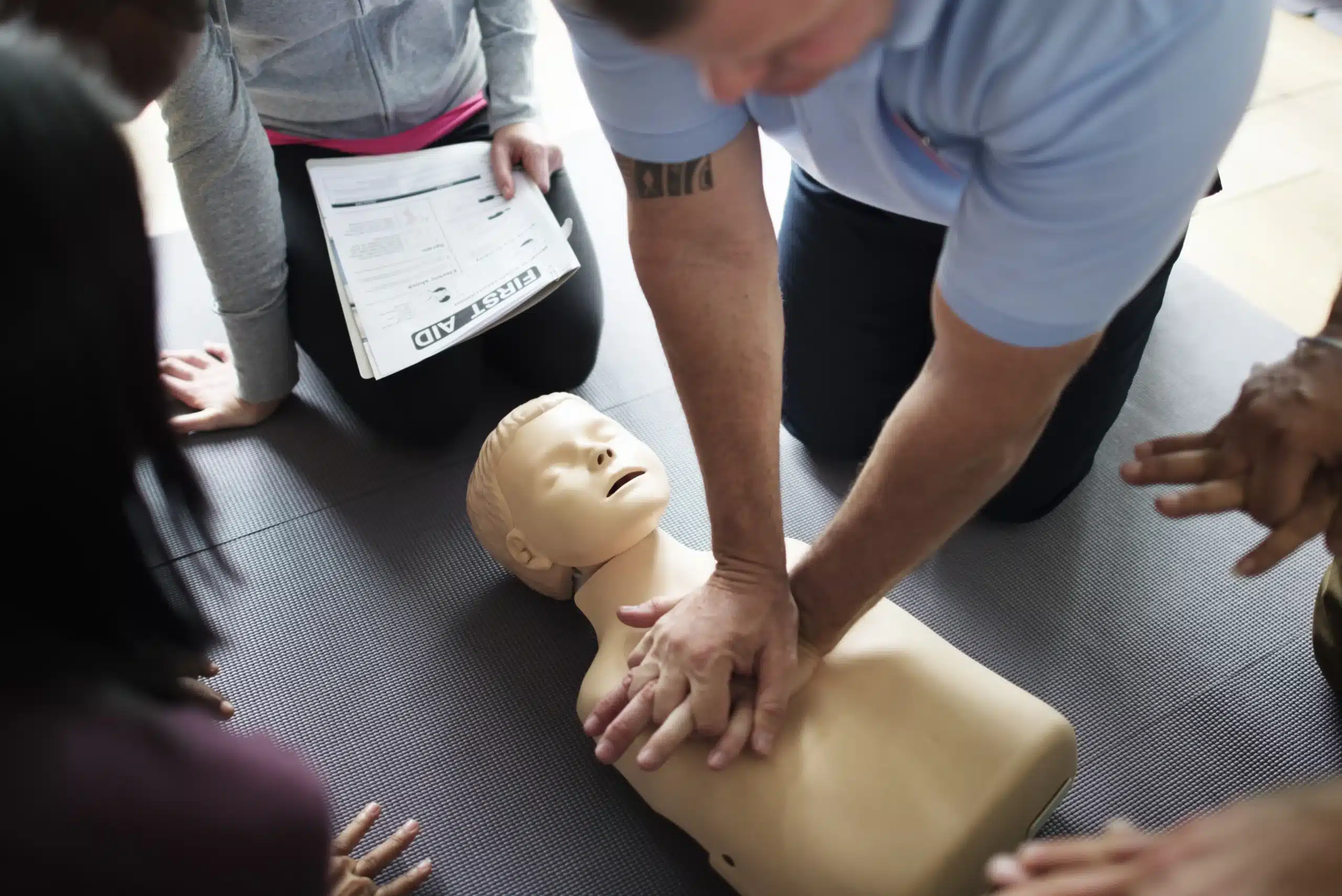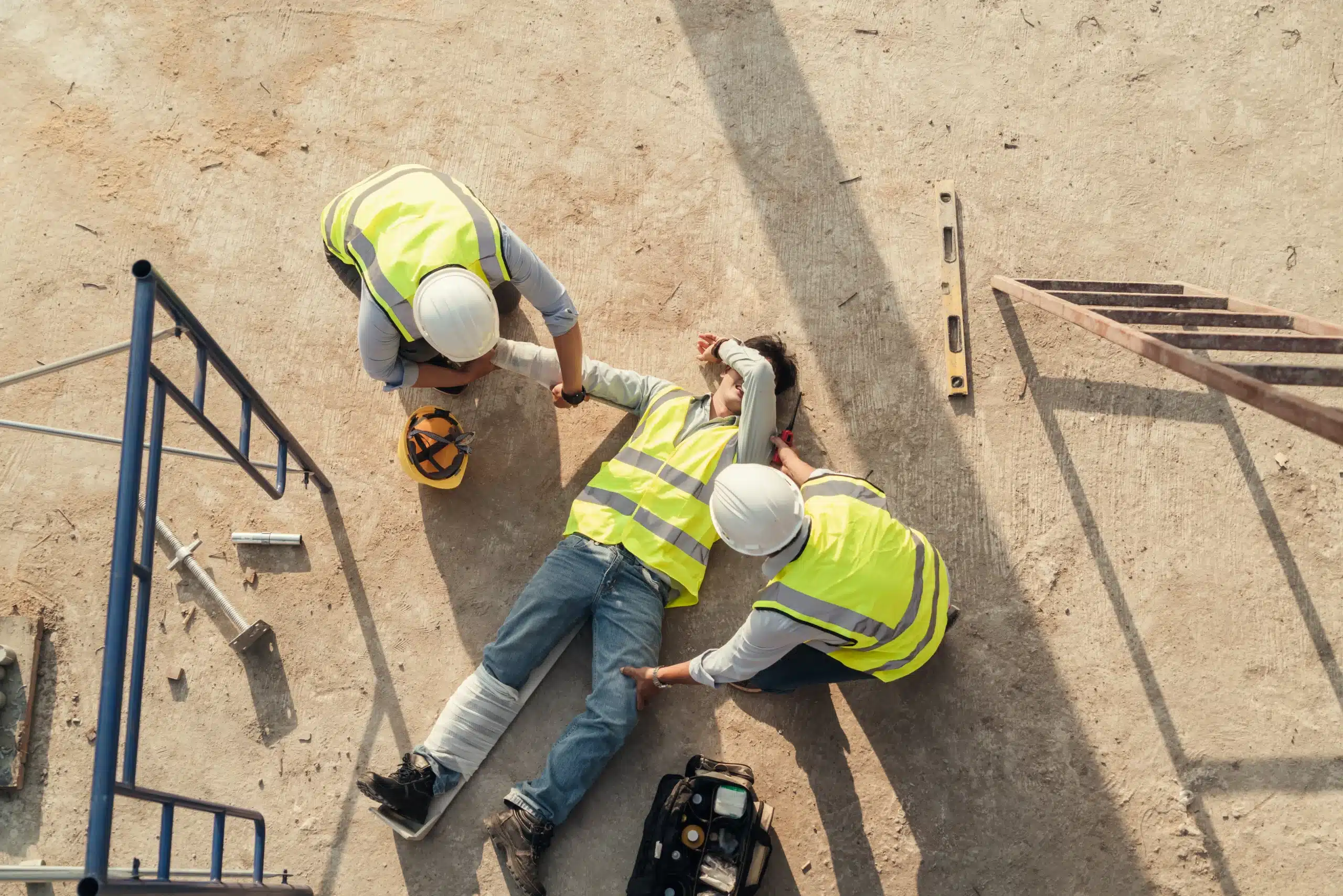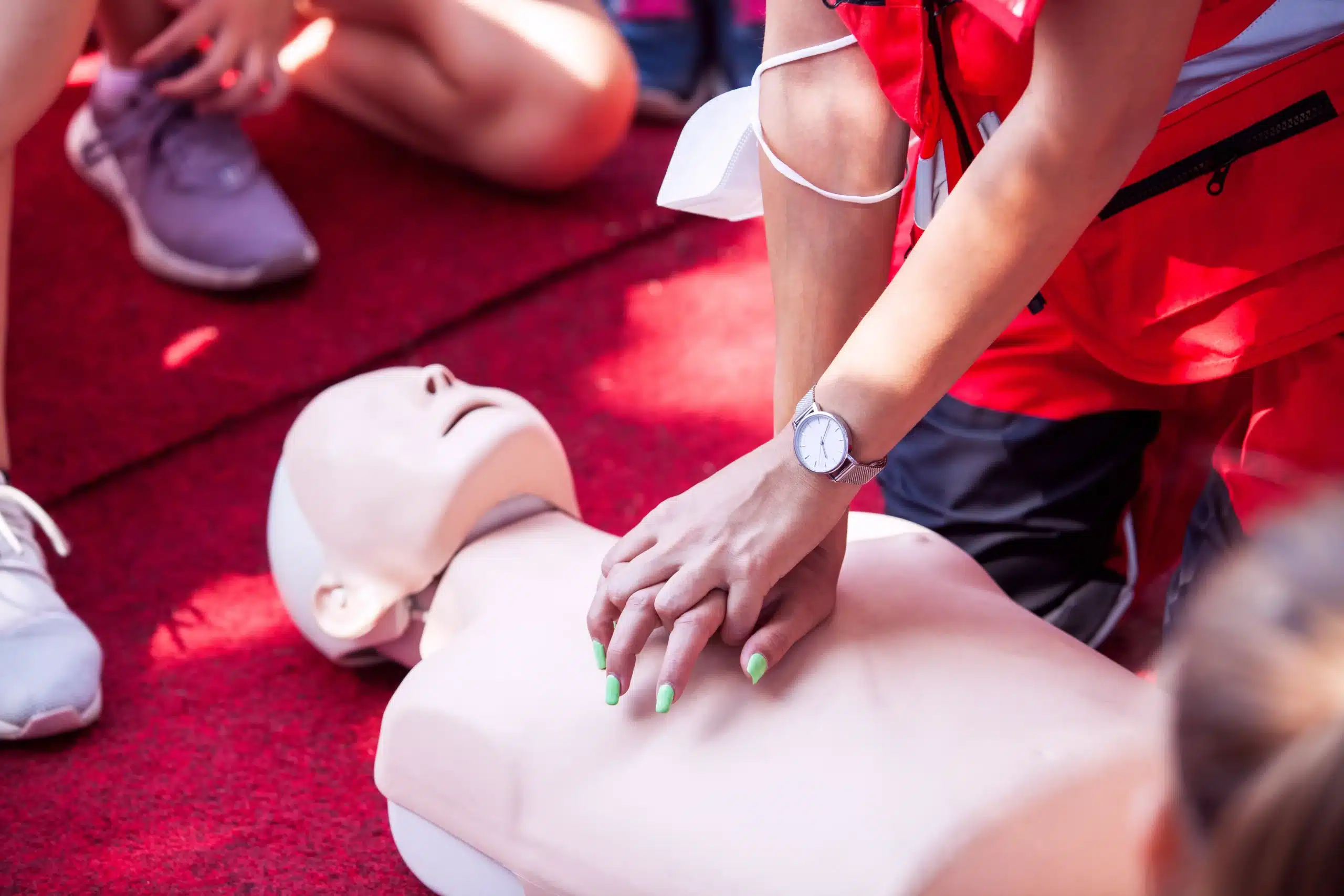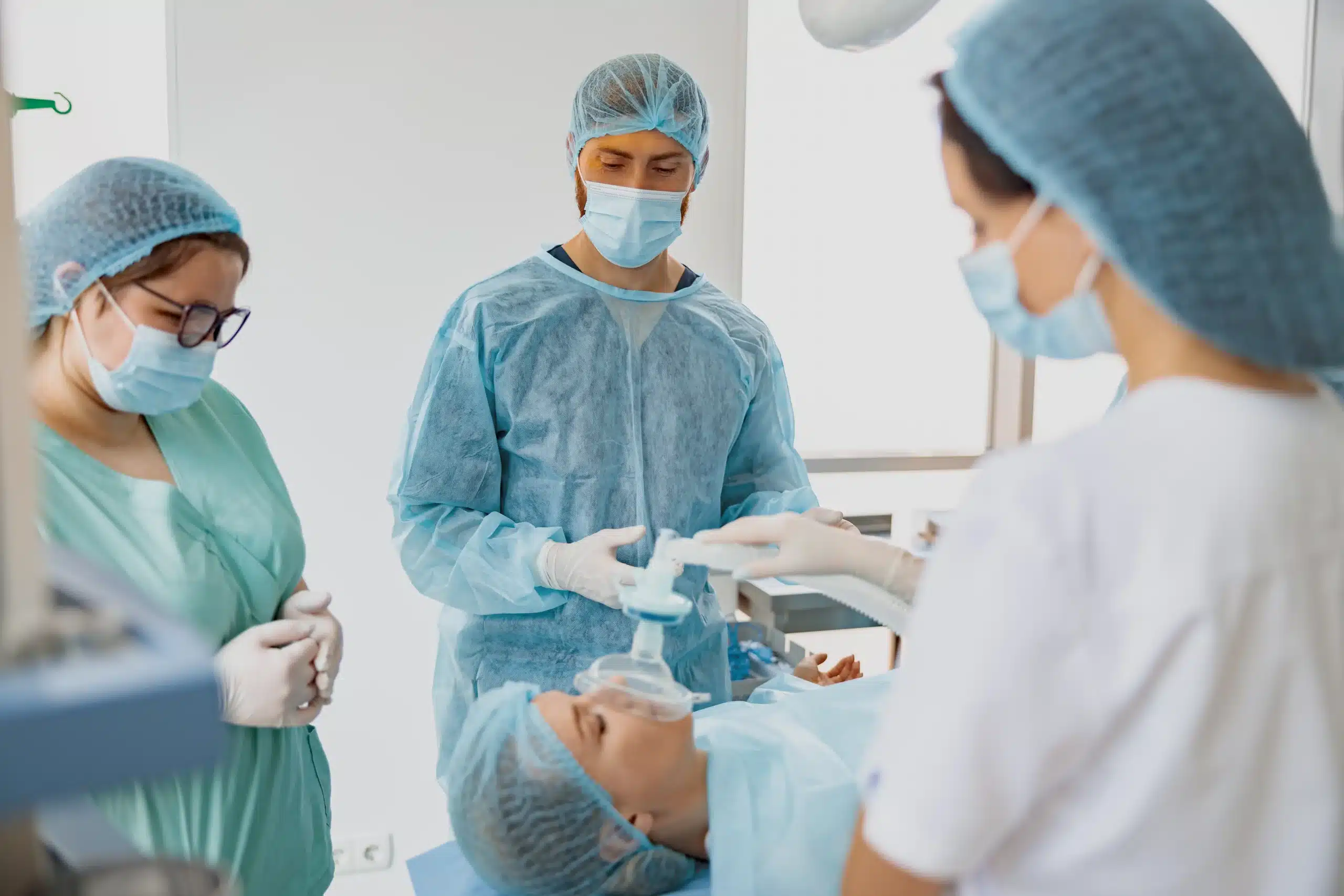Emergencies can happen when we least expect them. Are you prepared to respond? Learning first-aid in Menlo Park equips you with the skills and confidence to handle a range of medical situations, from everyday injuries to life-threatening events. This guide explores the different types of first-aid training available in Menlo Park, including CPR, AED usage, and basic life support. We’ll discuss the benefits of becoming certified, the costs involved, and how to find reputable training providers in your area. Get ready to take the first step towards becoming a more prepared and confident individual.
Key Takeaways
- First aid skills are essential for everyone: Learning basic first aid empowers you to confidently handle common medical emergencies and provide crucial support until professional help arrives. Explore the various courses available in Menlo Park to find the right fit for your needs.
- Choosing the right course is key: Consider your specific needs and goals when selecting a first aid course. Think about the type of certification you want, the course content and duration, and the qualifications of the instructors. This ensures you get the most out of your training.
- Maintain your skills through practice and continuing education: First aid skills require regular practice and refreshing. Take advantage of online resources, refresher courses, and recertification opportunities to stay up-to-date and prepared for any emergency.
What is First Aid Training in Menlo Park?
First aid training in Menlo Park gives you the skills to handle medical emergencies. These courses cover various techniques, from CPR (Cardiopulmonary Resuscitation) and using an AED (Automated External Defibrillator) to treating minor injuries like cuts and burns. Think of it as your personal toolkit for responding to accidents and illnesses before professional help arrives. Learning these skills can make a real difference.
Several organizations in Menlo Park offer comprehensive first aid training. Menlo Fire CERT teaches residents how to manage medical emergencies until first responders arrive, focusing on practical skills and building confidence. For a more personalized approach, In-Home CPR offers instruction in your home or office, covering CPR, first aid, and BLS (Basic Life Support) certification. You can also find comprehensive First Aid, CPR, and AED courses designed to prepare you for various emergencies, from choking incidents to sudden cardiac arrest. These skills benefit you and contribute to a safer community.
First Aid Course Types
Knowing what type of first aid training you need can feel overwhelming with so many options. This section breaks down the most common types of first aid courses available in Menlo Park, helping you choose the right one for your specific needs.
Basic First Aid
Basic first aid courses equip you with the fundamental skills to handle common medical emergencies. You’ll learn how to assess a situation, control bleeding, manage burns, sprains, and fractures, and provide care for someone experiencing a medical emergency like choking or sudden cardiac arrest. These courses emphasize the importance of recognizing when to call 911 and how to provide initial support until professional help arrives. A basic first aid course is a valuable asset for anyone, promoting personal safety and community well-being. For more information on combined first aid and CPR courses, check out this resource on basic first aid and CPR.
CPR and AED Training
CPR and AED training focuses on teaching you the life-saving techniques of cardiopulmonary resuscitation (CPR) and how to use an automated external defibrillator (AED). These courses typically run for about two hours and cover essential skills for responding to cardiac arrest. You’ll learn how to perform chest compressions, rescue breaths, and operate an AED safely and effectively. CPR training is crucial for healthcare professionals, but also highly recommended for anyone who wants to be prepared to help in a medical emergency. Explore CPR training options and pricing in your area with this helpful guide to CPR training.
Advanced Life Support Courses
Advanced Life Support (ALS) courses are designed for healthcare providers and emergency responders who require advanced skills in managing life-threatening medical situations. These courses delve into advanced CPR techniques, airway management, and other critical interventions. Redwood City CPR Classes offers a range of AHA courses including ALS certifications, ensuring that healthcare professionals in Menlo Park have access to high-quality training. These advanced courses build upon the foundational knowledge of basic first aid and CPR, providing participants with the expertise to handle complex medical emergencies.
Top Menlo Park First Aid Training Providers
Finding the right first aid training can feel overwhelming, so we’ve compiled a list of top providers in Menlo Park to help you get started. Each offers different courses and approaches, so you can choose the best fit for your needs.
Redwood City CPR Classes
Redwood City CPR Classes offers a comprehensive range of American Heart Association (AHA) courses. These include BLS for healthcare providers and First Aid training for the general public. They also offer advanced certifications like ACLS and PALS, making them a one-stop shop for all levels. Redwood City CPR Classes focuses on providing high-quality instruction and convenient scheduling. Learn more about their group discounts.
Menlo Fire CERT
The Menlo Fire Community Emergency Response Team (CERT) program offers combined CPR and First Aid training. This program prepares citizens to handle medical emergencies until professional help arrives. The seven-hour course provides a solid foundation in basic life support skills.
In-Home CPR
In-Home CPR brings the training to you, offering convenient CPR, First Aid, and BLS certification courses at your Menlo Park home or business. This flexible option works well for individuals and groups who prefer on-site training. Their courses provide ASHI certification.
Cal First Aid
Serving the broader San Francisco Bay Area, Cal First Aid provides workplace safety services and supplies, including CPR/AED and First Aid training. As an AHA-authorized training center, they offer various learning formats, including hands-on, video-based, and personalized instruction.
American Red Cross
The American Red Cross is a nationally recognized organization offering various first aid training courses. Their certifications are widely accepted, and their courses cover essential, life-saving skills for responding to emergencies. They offer a reliable and standardized approach to first aid education.
First Aid Training Costs
Knowing the price range for first aid training helps you budget effectively. Several factors influence the final cost, so let’s break them down.
Factors Affecting Course Prices
The cost of first aid training depends on a few key things. The type of certification you’re pursuing plays a big role. A basic first aid course will typically be less expensive than a more advanced certification like Basic Life Support (BLS). The length of the course also matters—longer courses generally cost more. Finally, the training provider themselves influences pricing, with different organizations having different fee structures. For example, a short two-hour course covering CPR and AED usage might average around $35 per person, according to CPR training listings in Menlo Park.
Average Costs for Different Course Types
In Menlo Park, you’ll find a range of prices depending on the certification. Basic CPR and AED training often starts around $35 per person, as noted by providers like In Home CPR. More advanced certifications, such as BLS (often required for healthcare providers), will likely have a higher price tag. For specific pricing on BLS certification, check with providers like Redwood City CPR Classes. They also offer other American Heart Association courses like ACLS and PALS.
Group Discounts and Special Offers
If you’re training a team, look for group discounts. Many providers offer reduced rates for larger groups. For instance, some providers offer CPR and AED training for groups of eight or more for around $280 total, based on information from local CPR training resources. Redwood City CPR Classes has a low price guarantee and offers group discounts, so check their website for current offers. This can be a smart way to get your whole team trained without overspending.
Certifications and Validity
Knowing the difference between certification types and how long they’re valid is key when choosing a first aid course. Let’s break down the most common certifications you’ll find in Menlo Park.
American Heart Association Certifications
The American Heart Association (AHA) offers a range of courses for everyone from healthcare providers to the general public. These courses cover everything from the basics of CPR and First Aid to more advanced certifications like ACLS (Advanced Cardiovascular Life Support) and PALS (Pediatric Advanced Life Support). Each AHA course is designed to give you the skills and knowledge to handle emergencies. AHA certifications are widely recognized and respected.
Red Cross Certifications
The American Red Cross also provides First Aid and CPR/AED certification classes that meet OSHA requirements. These certifications are typically valid for two years. Like the AHA, the Red Cross offers courses for both individuals and groups, making them a flexible option.
Renew Your Certification
Keeping your skills current and your certifications up-to-date is essential. Refresher courses and updates are the best way to do this. Renewal courses help you stay prepared and compliant with all requirements. Staying up-to-date ensures you’re always ready to help in an emergency.
Choose the Right First Aid Course
Picking the right first aid course is the first step to becoming confident in your skills. It’s about finding the best fit for your specific needs and goals. Think about why you’re taking the course and what you hope to achieve.
Assess Your Needs
Before you start browsing courses, ask yourself a few key questions. Are you looking for basic life support skills to feel prepared for everyday emergencies? Do you need a certification for your job or to volunteer in your community? Understanding your “why” will guide you toward the right program. A first aid certificate demonstrates your ability to handle various emergencies, from performing CPR and using an AED to managing choking, bleeding, and other critical situations. Knowing this, what level of preparedness do you want to achieve?
Compare Course Content and Duration
Once you have a better sense of your needs, start comparing different courses. Look at what topics each course covers. Some programs focus solely on CPR and AED training, while others include a broader range of first aid skills. The course duration can also vary significantly. A basic first aid and CPR program can take around seven hours, covering essential skills to help you respond effectively until professional help arrives. More specialized courses, like those for healthcare providers, may require a longer time commitment. Menlo Fire CERT offers a seven-hour program focused on preparedness for various medical emergencies. Consider your available time and choose a course that fits your schedule. In Home CPR offers two-year ASHI certification courses, including CPR and AED training, for businesses and individuals.
Evaluate Instructor Qualifications
The quality of instruction can make a big difference in your learning experience. Look for courses taught by experienced medical professionals, such as EMTs, paramedics, or registered nurses. These instructors bring real-world knowledge to the classroom and can offer valuable insights. They also understand the importance of making learning engaging and interactive. In Home CPR highlights its instructors’ real-world experience and focus on interactive learning, which can be a deciding factor for many students. Choosing qualified instructors ensures you receive comprehensive training and develop the confidence to apply your skills effectively.
What to Expect in a First Aid Class
Knowing what to expect can help you feel prepared and confident going into your first aid training. From the balance of classroom learning to hands-on practice, understanding the curriculum and assessment process will set you up for success.
Classroom vs. Hands-on Training
First aid courses blend classroom instruction with practical, hands-on training. Expect a dynamic learning environment that combines presentations, discussions, and demonstrations with opportunities to practice your skills. Menlo Park CPR and AED classes often offer flexible training locations, including in-home or at your business, making it easier to fit training into your schedule.
Common Topics Covered
First aid training equips you with essential skills to handle various emergency situations. You’ll learn how to administer CPR, use an AED, and respond to emergencies like choking, severe bleeding, and allergic reactions. The goal is to provide you with the knowledge and confidence to act quickly and effectively until professional medical help arrives, as highlighted by Menlo Fire CERT. You’ll also learn to recognize and respond to cardiac and breathing emergencies. For more information on CPR specifically, check out our BLS CPR course information.
Assessment and Certification Process
Throughout the course, instructors will assess your understanding of the material and your ability to perform the necessary skills. This typically involves practical demonstrations and written exams. Upon successful completion, you’ll receive a certification, often valid for two years and meeting OSHA requirements. This certification demonstrates your competence in first aid and CPR, a valuable asset in both personal and professional settings. Menlo Park First Aid certifications typically follow this standard two-year validation.
Find First Aid Resources and Equipment in Menlo Park
Knowing where to find essential first aid supplies and equipment is just as important as having the skills to use them. This section helps you locate first aid kits, AEDs, and other resources in Menlo Park.
Where to Buy First Aid Kits
Stocking your home, car, or workplace with a comprehensive first aid kit is a crucial first step. For high-quality first aid kits and cabinets in the Menlo Park area, consider Cal First Aid, a Bay Area company specializing in workplace safety. They offer a wide selection of supplies to help businesses comply with OSHA and California safety standards.
AED Locations and Availability
Quick access to an Automated External Defibrillator (AED) can dramatically improve outcomes during cardiac emergencies. Cal First Aid also provides AEDs, along with training and maintenance services. They even offer free site assessments to ensure your AED setup complies with California law and is registered with local EMS.
Local Medical Supply Stores
Beyond having the right equipment, knowing how to use it is essential. For convenient, on-site training, In Home CPR offers CPR, First Aid, and BLS certification courses directly to your home or business in Menlo Park. Additionally, for those near Redwood City, Safety Training Seminars provides American Heart Association courses, including BLS, ACLS, PALS, and CPR. These courses provide the skills and knowledge needed to respond effectively in various emergency situations.
Benefits of First Aid Training for Menlo Park Residents
Knowing what to do in a medical emergency can make all the difference. First aid training empowers Menlo Park residents to confidently handle crises and contribute to a safer community. Let’s explore some key advantages:
Prepare and Build Confidence
First aid training provides residents with the skills to respond effectively to emergencies. Learning to administer CPR, use an AED, and control bleeding equips you to handle situations like cardiac arrest, choking, or severe bleeding. This training builds confidence, knowing you can provide immediate assistance until professional help arrives. Menlo Fire CERT emphasizes community preparedness through their first aid training program. It’s about being prepared and knowing you can make a difference. A first aid certificate validates your skills and demonstrates your commitment to community safety. You can find local CPR training options in Menlo Park to get started.
Enhance Workplace Safety
First aid training is a valuable asset in any workplace. Many businesses must adhere to OSHA and California safety standards, and providing first aid training helps them meet these requirements. Cal First Aid offers services to help businesses comply with these standards. Menlo Park certification classes often align with OSHA requirements, ensuring employees are prepared for workplace emergencies. This training creates a safer work environment for everyone and can be crucial in mitigating injuries and potentially saving lives.
Contribute to Community Resilience
First aid training strengthens community resilience. When residents are equipped to handle emergencies, the entire community benefits. The ability to recognize and respond to cardiac or breathing emergencies, and provide basic first aid, creates a network of support. CPR and first aid training empowers individuals to act quickly and effectively, contributing to a safer and more prepared Menlo Park. Redwood City CPR Classes offers certification courses that equip residents to respond confidently to emergencies in various settings, from homes and workplaces to public spaces.
Maintain Your First Aid Skills
Learning first aid is a smart move, but it’s not a one-and-done deal. Like any skill, it gets rusty if you don’t keep it up. Regularly refreshing your knowledge and practicing your techniques are key to staying prepared for emergencies.
Take Refresher Courses and Recertify
Certifications expire, and so does knowledge. Guidelines and best practices change, so taking refresher courses is crucial. Redwood City CPR Classes offers a variety of recertification courses, including those for American Heart Association certifications like BLS, ACLS, and PALS. This ensures your skills are current and your certification remains valid.
Practice at Home
Don’t let your skills lapse between courses. Regular practice is essential for maintaining proficiency. You can practice basic bandaging techniques, wound care, and CPR on a mannequin. Even mentally rehearsing the steps you’d take in different emergency scenarios can make a difference.
Find Online Resources for Continued Learning
The internet offers a wealth of resources to help you stay sharp. Websites like the American Red Cross and the National Safety Council provide valuable information, videos, and tutorials on various first aid topics. Use these resources to review procedures, learn new techniques, and stay updated on the latest guidelines. This ongoing learning is key to providing effective assistance during emergencies.
Related Articles
- Advanced Cardiac Life Support (ACLS) in Menlo Park – Redwood City CPR Classes
- ACLS Renewal Palo Alto: Your Complete Guide – Redwood City CPR Classes
- AHA Courses Redwood City: Your Guide to Certification – Redwood City CPR Classes
- BLS, ACLS, PALS, CPR & First-aid Classes in Redwood City, CA
- Northern CA CPR Directory – Redwood City CPR Classes
Frequently Asked Questions
What’s the difference between basic first aid and advanced life support?
Basic first aid focuses on essential skills for common injuries and emergencies, like cuts, burns, and choking. It’s designed for anyone, regardless of medical background. Advanced life support, on the other hand, goes deeper into complex medical situations and is geared towards healthcare professionals and first responders. Think of basic first aid as your everyday toolkit, while ALS is for those dealing with more critical situations.
How much does first aid training cost in Menlo Park?
Costs vary depending on the type of course and the provider. Basic first aid and CPR/AED courses usually start around $35 per person, while more advanced certifications like BLS will be more. Look for group discounts if you’re training multiple people. Always check directly with the training provider for the most up-to-date pricing.
Which first aid certification is right for me?
The best certification depends on your goals. If you want basic skills for everyday emergencies or to volunteer, a standard first aid and CPR/AED course is a great starting point. Healthcare providers and those in specific professions often require more advanced certifications like BLS, ACLS, or PALS. Consider your current role and future aspirations when making your decision.
How long are first aid certifications valid, and how do I renew them?
Most first aid certifications are valid for two years. To renew, you’ll need to take a recertification course. This ensures your skills and knowledge are current. Check with your certifying organization for specific renewal requirements and options.
What can I expect during a first aid class?
Expect a mix of classroom learning and hands-on practice. You’ll learn essential skills like CPR, using an AED, bandaging wounds, and managing various medical emergencies. Instructors will demonstrate techniques, and you’ll have opportunities to practice in a safe environment. There’s usually a written exam and a practical skills assessment to ensure you’ve grasped the material.
